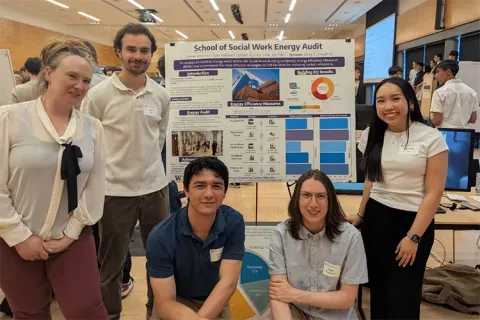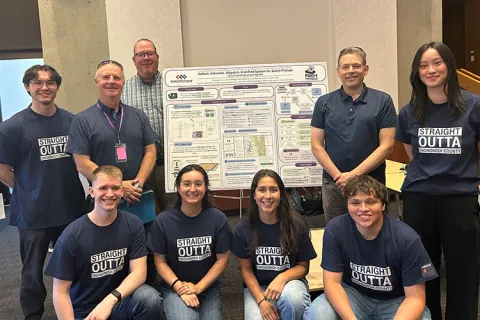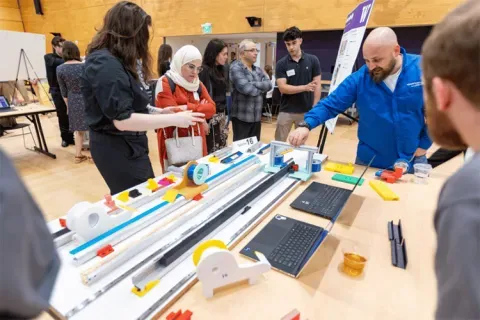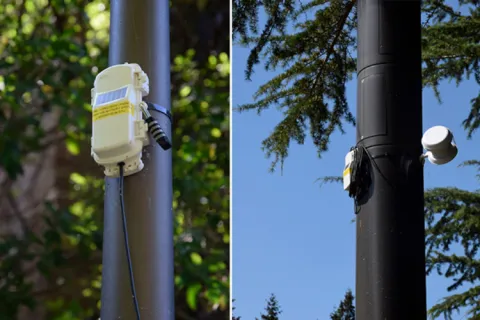The Industry Capstone Program brings together UW College of Engineering students and professionals to tackle real-world, interdisciplinary engineering problems. Sponsors bring in projects from their organizations and provide support to teams of creative and talented engineering students who design and build innovative solutions.
Work with us to develop the next generation of engineering leaders!
Help shape the future of engineering while also gaining new insights and fresh perspectives for your organization.
Past capstone projects Submit a project proposalBenefits to sponsors
-
Meaningful engagement
Customized opportunities to assess student talent and recruit for jobs
-
Creative problem-solving
Low-cost opportunity for a fresh look at a problem
-
Professional development
Opportunity for technical mentor to practice and apply leadership skills
-
Brand recognition
Boost public awareness of your organization through student engagement
-
UW partnerships
Build impactful connections within the UW College of Engineering
-
Commercial licenses
Non-exclusive commercial license to any IP developed through project
How it works
Innovation
Potential sponsors propose a project for review by College of Engineering faculty
Sponsorship
Organizations commit financially to cover project costs and $18,000 program fee
Team matching
Students are matched to an approved project and faculty mentor
Mentorship
Technical mentor meets with the team weekly for project duration (January – June)
Problem-solving
Teams embark on a full-scale design process with help from technical and faculty mentors
What makes a good proposal?
- Scoped for a small team of students, with design and performance criteria requiring appropriate analytical study on a topic directly relevant to engineering
- Contains both a design and results phase, culminating in a specific project outcome
- Reflects lower-priority real-world problems faced by your organization; mission-critical problems are not appropriate projects
- Appropriate for entry-level engineers in their first or second year on the job
- Primarily self-contained, but also integrates within a larger context
We strongly encourage projects that are open to all UW Engineering students, regardless of citizenship.
Explore past capstone projects
Refer to previous years of capstone projects and learn more about the exciting ways in which students partnered with industry sponsors.
Industry-sponsored capstone projectsOther ways to explore capstone programs
Department-based capstone programs
Additional engineering capstone offerings
Sample timeline
Early September
PROJECT PROPOSAL DUE
Submit a two-page document outlining pertinent details of your project. This document serves as a starting point for collaboration with College of Engineering departments.
Late October
PROJECT PROPOSAL PRESENTATIONS
Approved proposals are presented, showcasing information about project requirements and scope. This information is used to determine student compatibility and team composition.
Early December
MENTOR ORIENTATION AND TEAM KICKOFF
Sponsors are provided with a departmental program overview. Student teams are matched and announced, and may connect to sponsors prior to the start of the project.
January - June
PROJECTS IN PROGRESS
Weekly team meetings take place between the student teams and mentors as project design and build processes develop throughout the winter and spring quarters.
June
FINAL CAPSTONE SHOWCASE
The capstone program culminates in events where student teams present their projects, explain their work, answer questions, and demonstrate working prototypes.
Submit a proposal
Project proposals are accepted from June through September. College of Engineering faculty can advise on project ideas and scope upon request.
Submit your project proposal


